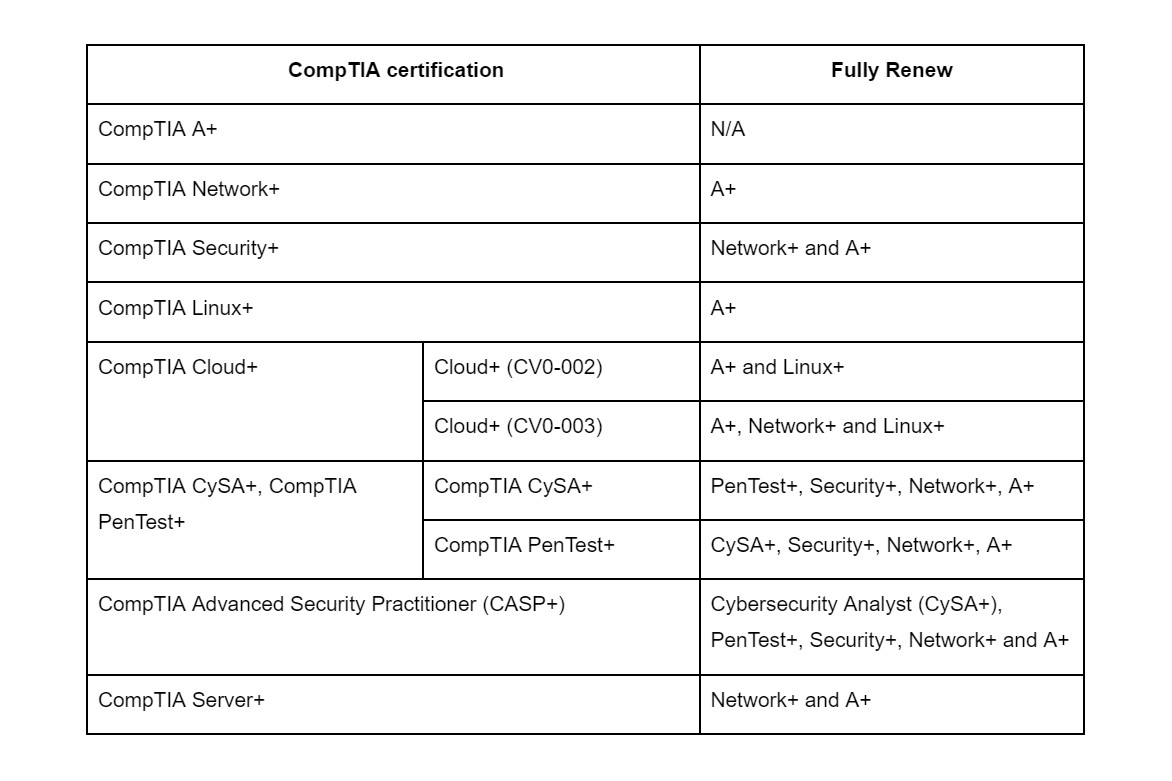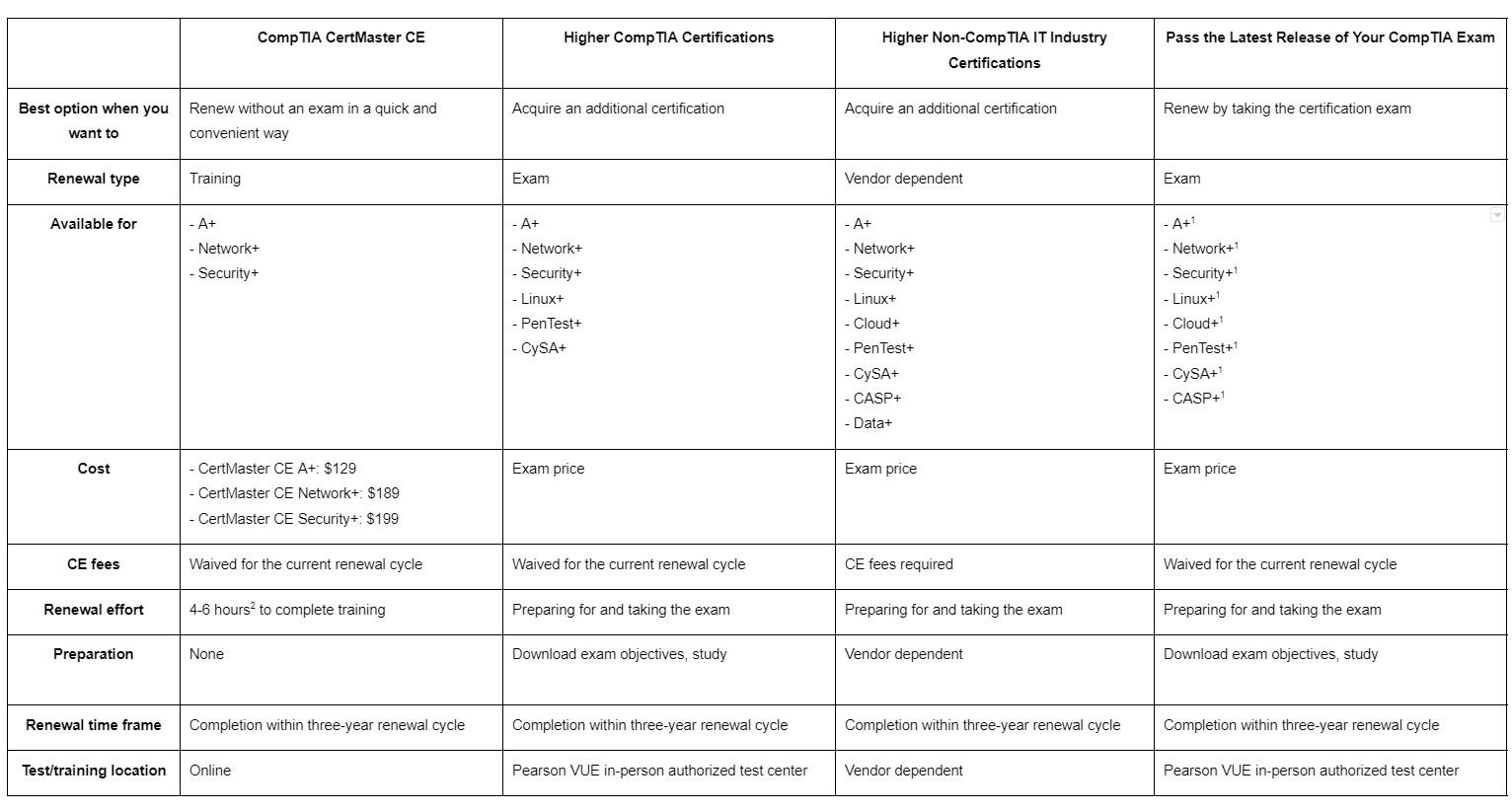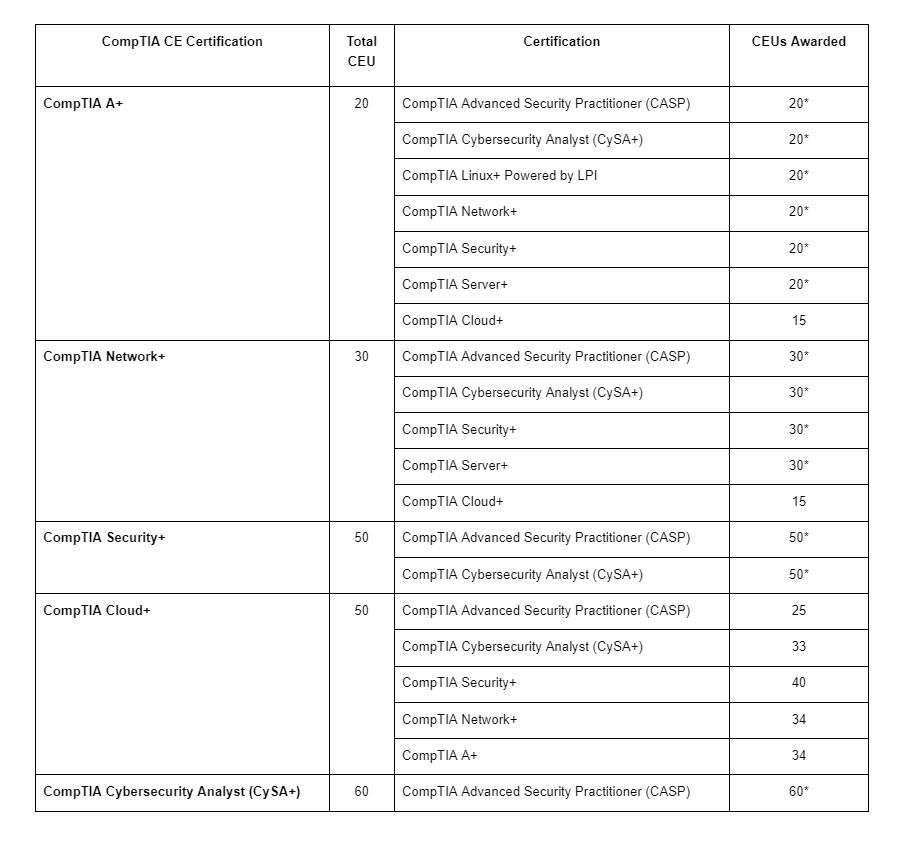When you are hunting through job postings, sometimes you may see CompTIA Security+ as a requirement, sometimes you might see CompTIA Security+ CE instead. So what is the difference between Security+ and Security+ CE? Let’s follow this article to find the answer to this.
CompTIA Security+: A Vital Certification for IT Security Pros
A globally acknowledged certificate for IT security experts, Security+ is a vendor-neutral credential that encompasses the core principles of security, such as threat management, incident response, cryptography, and risk mitigation.
Benefits and Purpose
The purpose of Security+ is to attest to the proficiency of IT security professionals in crucial security aspects. With this certification, IT experts can exhibit their expertise in securing networks, systems, and applications, and also establish a base for advanced security certifications.
Exam Prerequisites
Individuals must pass a single comprehensive exam that covers a broad spectrum of security topics to attain the Security+ certification. The exam comprises 90 multiple-choice and performance-based questions that must be answered within 90 minutes.
Exam Coverage
The Security+ exam assesses knowledge in a wide range of topics, including cryptography, access control, network security, threat management, and security operations, as well as the latest security advancements like IoT, virtualization, and cloud computing.
Career Opportunities
Possession of a Security+ certificate opens doors to various security-related careers, including security consultant, network administrator, security analyst, and security engineer, and also provides opportunities for growth in the field by exhibiting dedication to keeping up-to-date with the newest security technologies and best practices.
Read more >> How to find CompTIA certification number?
A Journey Through Security+ Continuing Education (CE)
For IT professionals who hold the esteemed Security+ certification, the Security+ Continuing Education (CE) program is a crucial next step. This ongoing certification program mandates the recertification of its holders every three years, imbuing the field of cybersecurity with a constant stream of current knowledge and skill.
Benefits and Purpose
The Security+ CE certification serves to keep IT professionals at the forefront of advancements in cybersecurity. Its benefits are numerous and include:
- The maintenance of a current understanding and mastery of the field of cybersecurity.
- A display of unwavering commitment to professional development.
- Staying ahead of the constantly shifting threat landscape.
- Improving career prospects by demonstrating a grasp of current knowledge and skills.
Exam Prerequisites
Unlike conventional certification exams, the Security+ CE does not require a test for recertification. Instead, it mandates the earning of Continuing Professional Education (CPE) credits through participation in professional development activities. These activities could range from attending conferences to taking courses or conducting research. The following topics serve as a guide to the type of knowledge and skills individuals may seek to cultivate in order to earn CPE credits and recertify their Security+ CE certification:
- Network security
- Compliance and operational security
- Threats and vulnerabilities
- Application, data, and host security
- Access control and identity management
- Cryptography
Career Opportunities
The Security+ CE certification is a testament to an individual’s dedication to professional development and their ability to stay current in the field of cybersecurity. It is a valuable asset for IT professionals seeking advancement in their careers, opening doors to roles such as:
- Cybersecurity analyst
- Network security administrator
- Information security analyst
- Security Engineer
- Information assurance specialist
In conclusion, the Security+ CE certification provides IT professionals with a unique opportunity to demonstrate their commitment to professional development and their grasp of current knowledge and skills in cybersecurity. The certification not only offers numerous career opportunities but also strengthens one’s competitiveness in the job market.
What Is The Difference Between Security+ and Security+ CE?
Security+ CE isn’t a standalone accreditation but instead refers to the obligation placed on those who hold the Security+ certification to participate in ongoing education to renew their certification every 36 months. This stipulation makes it clear that Security+ CE is not a different certificate from the Security+ certification, just a mandate for preserving the Security+ certification.
With regards to the recertification cycle, the Security+ certification requires a 3-year recertification process, to make sure that holders of the certification are up-to-date with the newest trends in the realm of information security.
Both the Security+ certification and Security+ CE exams are computer-based evaluations provided by CompTIA, the certifying organization. The Security+ certification exam is a 90-minute, 90-question evaluation, composed of multiple-choice and performance-based questions, offered in English, German, Japanese, and Portuguese. To pass, individuals must earn a minimum score of 750 out of a possible 100-900 points.
The cost of the Security+ certification varies by testing center and region, with a typical cost of around $320, while the cost of the Security+ CE recertification is dependent on the selected continuing education courses, but is typically less expensive compared to the initial certification exam. Both certifications are accessible at authorized CompTIA testing centers worldwide.
The Security+ certification is intended to furnish individuals with a complete understanding of information security’s fundamental principles. The exam encompasses a wide spectrum of subjects, such as network security, risk management, threat management, and incident response, with the aim of providing individuals with a robust foundation in information security principles that can be applied across various industries and roles.
Conversely, the Security+ CE is aimed at keeping individuals’ knowledge and skills up-to-date in the field of information security by mandating continuing education courses. This emphasis is especially crucial for individuals working in swiftly changing industries or who desire to remain ahead in their careers.
How to Renew Your CompTIA Certification?
The following certifications (earned on or after January 1, 2011) are valid for three years from the date of certification:
Renew with a Single Activity
By completing a single activity, you have several options for renewing your CompTIA certification.
Complete CompTIA CertMaster CE
- CertMaster CE for A+: available for individuals certified in exam versions 801/802 or earlier
- CertMaster CE for Network+: available for individuals certified in exam version N10-005 or earlier
- CertMaster CE for Security+: available for individuals certified in exam version SY0-004 or earlier
Earn a higher-level CompTIA certification
Earning a qualified higher-level CompTIA certification can also renew your lower-level CompTIA certifications. Read the table below to see which CompTIA certifications will automatically renew other ones.
Earn a Non-CompTIA Certification
Continuing Education Units (CEUs) Awarded for Activity:
- CompTIA A+: 20 CEUs
- CompTIA Network+: 30 CEUs
- CompTIA Security+: 50 CEUs
- CompTIA Cloud+: 50 CEUs
- CySA+: 60 CEUs
- CASP: 75 CEUs
Pass the Latest Release of the CompTIA Exam
Example: If you are renewing your CompTIA Security+ N-007 certification, you can do so by taking and passing the CompTIA Security+ N-008 exams. On this website, you can prepare for your coming exam with our latest CompTIA Security+ practice test to pass the exam with a high score on the first try.
Compare Single-Activity Renewal Options

(1) Available if there is a newer version of the CompTIA exam for the certification you currently hold.
(2) Estimate based on typical individual experience.
Renew with Multiple Activities
Alternatively, you can earn the number of CEUs you need to renew your CompTIA certification by completing a combination of activities.
Earn an Additional CompTIA Certification
In this table, you will find the way to renew your CompTIA Security plus CE certification, the total CEU requirements for renewal, and CompTIA certifications that count towards renewal.

(*) Items automatically renew the certification you are seeking to renew as they meet the total CEU requirements.
Complete training and higher education
Review the table below to see the maximum number of CEUs you can get for each qualifying activity during your three-year renewal cycle.

Participate in IT industry activities
Review the table below to see the maximum number of CEUs you can get for each qualifying activity during your three-year renewal cycle.

Publish a relevant article, white paper, blog post or book
Review the table below to see the maximum number of CEUs you can get for each qualifying activity during your three-year renewal cycle.

Gain related work experience
Review the table below to see the maximum number of CEUs you can get for each qualifying activity during your three-year renewal cycle.

Read more >> Difference Between CompTIA Security+ 501 and 601
Difference Between Security+ And Security+ CE – FAQs
What is the main difference between Security+ and Security+ CE?
The fundamental distinction between Security+ and its Continuing Education (CE) iteration lies in the fact that the former is a certificate that showcases a person’s extensive knowledge on the quintessential concepts of information security. Meanwhile, Security+ CE is mandated to renew the Security+ certification every three years through the completion of continuing education courses.
Is Security+ CE a separate certification from Security+?
Absolutely not. In fact, Security+ CE is just an abbreviated term for the Security+ Continuing Education requirement, which demands those who possess the Security+ certification to undertake continuing education courses to keep their certificate valid every three years.
Why is Security+ CE required?
The reason behind this is simple – Security+ CE serves as a testament to an individual’s continuous dedication to their profession, and it helps them stay abreast of the latest advancements and developments in the realm of information security.
How often is Security+ CE required?
It’s an every three-year requirement to maintain the Security+ certification.
What is the cost of Security+ CE?
The expense of Security+ CE varies based on the continuing education courses chosen, however, it’s usually more affordable than taking the initial Security+ certification exam.
How does Security+ CE differ from Security+ in terms of examination format?
Both the Security+ and Security+ CE certification exams are administered as computer-based tests by CompTIA, the certifying body. While the Security+ certification exam consists of 90 multiple-choice and performance-based questions, the format of the Security+ CE exam may differ based on the continuing education courses selected.
What is the focus of Security+ CE?
The primary objective of Security+ CE is to provide individuals with a platform to keep their information security knowledge and skills current and to keep pace with the latest advancements and developments in the field.
Conclusion
You have found the answer to the question “what is the difference between Security+ and Security+ CE“. You could rely on it to find the best suitable job for you.
Sometimes a job posting will say CompTIA Security+ce and it will require a current CompTIA Security+ CE in good standing. This is particularly true in government contracts. Most government contracts require certifications at a certain level or higher, so if it says Security+ CE and all you have is only the old Security+, and you don’t have any higher-level certification like CISM, CISSP, or CEH, you will need to sit for Security+ CE and start paying the annual fee and submitting CEUs.

PCCN vs CCRN: Which Certification Should I Take?
In this discussion, we will examine the fundamental distinctions between PCCN vs CCRN certifications, allowing you to make an informed and right decision about which certification is best for your nursing career progression.
June 20, 2023

Is PCCN Worth It? A Comprehensive 2025 Study Guide
In this article, we will provide all the enrollment criteria, how to apply, whether is PCCN worth it for you to obtain, and how to get a high mark.
June 20, 2023

PCCN Requirements - How to Become a Progressive Care Certified Nurse?
To become a progressive care nurse, you must first obtain the PCCN certification. This post will help you understand PCCN certification, PCCN requirements, and efficient approaches to obtaining this certification.
June 20, 2023

